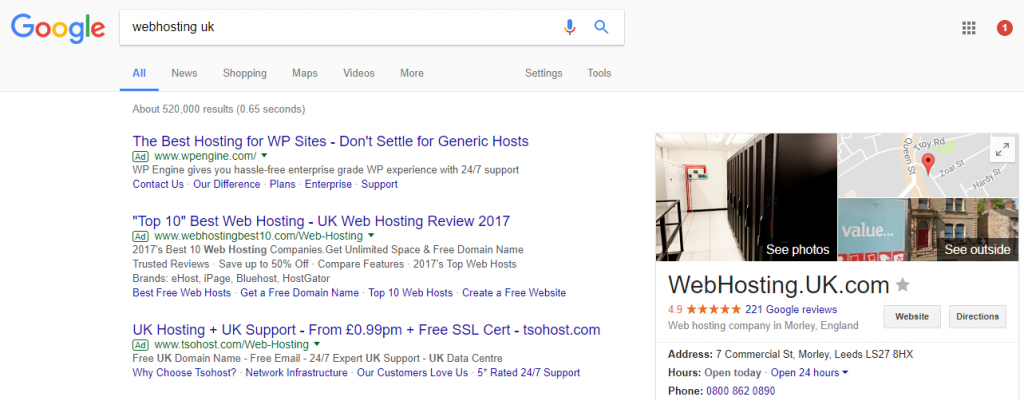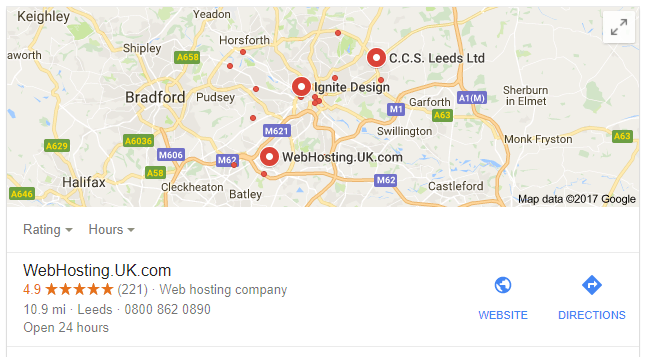Shifting behaviours in mobile phone use are having a big impact on local businesses. With better network coverage and a growth in wi-fi hotspots, 94% of smartphone owners now use their phones to find nearby businesses. As over three-quarters of these searches result in an in-store purchase, those websites that rank well locally on Google are benefitting from this, those that aren’t are missing out. In this post, we’ll take a look at Google’s main ranking factors for local SEO so that your business can benefit too.
Here are the top five local ranking factors.
- Name, address and phone number (NAP) visibility
One of the most important local ranking factors is NAP visibility. This means that the name, address and phone number of your business should be clearly displayed throughout your entire website. There are a number of ways you can achieve this:
- Put the name, address and phone number in the header or footer of your website so that it appears on every page.
- Include the location of your business in your URLs e.g. mybusiness.com/services-leeds.
- Include the location of your business, together with other keywords, in H1 page and post titles and H2 subheadings, e.g., Aberdeen Painting and Decorating Services.
- If your business serves several locations, create separate web pages for them all, e.g., Window Repairs Harringay, Window Repairs Hackney, Window Repairs islington.
- Use location information in image URLS, descriptions and alt tags.
If you haven’t yet set up your website and chosen a domain name, it can also be beneficial to include a location in your domain name, e.g., clarkesbakerybrampton.co.uk.
Do remember to keep your NAP consistent. Make sure you write exactly the same address everywhere, this way it won’t confuse Google.
- High-quality backlinks
One factor that Google and other search engines always take into account is the quality of external links to your website. A few links from other high-ranking websites, especially those that are relevant to your niche or location, can do wonders for your ranking. A link from a local newspaper site, a well-respected review site, an industry publication, etc., can really help. Especially if they include your location in their anchor text. For example, ‘Visit Jones’ Bookshop’ is not as effective as ‘Visit Jones’ Bookshop in Hull’. If people do link to you, it can be helpful to contact them and ask if they can do this for you.
Do be warned, though, whilst links from high-quality websites are good for increasing your ranking, links from poor quality websites, together with those which have been paid for or submitted on forums and blog comments, will be seen as spammy links and may get you a Google penalty. If this happens, your website will disappear from Google altogether. - Having a Google My Business listing
One certain way to get Google on your side is to use their free business listing service, Google My Business. Companies that have set up and completed their My Business profile page not only get a big boost in their local rankings but also get one of these:
This means when someone searches for your business by name, the user is given lots of information about your company, including reviews, maps, contact details and website links. You can even post images on there.
For general searches, being listed on Google My Business also gives you a much better chance of turning up in the top search results and being shown on Google’s local results map. This is the result for the search ‘web host Leeds’.
As Google My Business is completely free to use, it makes complete sense for any local business to take full advantage of the SEO and other benefits it has to offer. Just remember to fully complete your profile, including your NAP, website address and opening hours. - Customer reviews and NAP mentions
Google is very conscious of the importance of independent customer reviews and takes them into account when ranking a local business. Registering your business with organisations such as TrustPilot which shares reviews publicly can have a positive impact – though you will need positive reviews. There are many other reputable sites which also enable customer reviews, such as Yell and Trip Advisor. Not surprisingly, the reviews which have the biggest impact on your Google ranking are those made on your Google My Business page.
A word of warning though – Google can become suspicious if all your ratings are glowing five-star reviews. If it suspects you have been adding reviews of your own business, it can suspend your account and penalise your website.
The other benefit of joining these sites is that they also publish your NAP. As Google takes the number of NAP mentions into account when ranking, signing up to a number of high authority directories could be a wise SEO move. - Social media impact
In the same way that Google takes notice of customer reviews, it also looks at social media responses to your business in order to determine where to rank your website. Obviously, if lots of people are liking, sharing and making positive comments about your business, it’s a sign to search engines that yours is a business that’s worth ranking highly.
The most important step you can make to get the ball rolling is to create social media accounts for your business. Which platforms you should use depends entirely on your business and the types of customers you serve. However, as mobile users spend more time on Facebook than they do on any other app or search engine, you’d be missing out if it wasn’t on your list. For those who want to rank higher on Google, then a Google+ account is a must, too.
Once you have your accounts set up, you then need to encourage users to follow your business and to like, share and comment. This means putting time and effort into creating great content, engaging with your visitors and explicitly asking them to like and share.
The other SEO benefit of using social media is that if someone local likes your business, then the Google algorithm has the capacity to understand that similar people will like it too. So, if you sell baby clothes, for example, and someone gives you a like, Google may show your site in their friends’ search results when they search for similar things. Similarly, if a fifty-year-old man likes a hair stylist in a local town, other fifty-somethings might see that stylist ranking highly in their search results. The more likes you get, the more this will happen.
Conclusion
Getting to the top of the Google search results takes time and commitment, however, from following the tips in this post, you’ll have a better understanding of the five local SEO ranking factors that have the biggest impact.
If you run a local business and need hosting for your website, take a look at our wide range of cloud-based cPanel hosting packages or search for your new business domain name.

